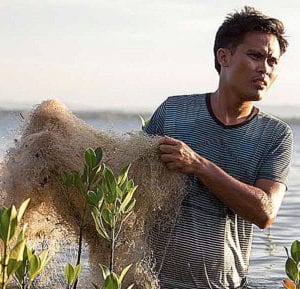Discarded fishing nets on the coast of the Philippines have received a second chance to be useful thanks to the Interface Net-Works programme.
The programme which involves collecting discarded nets along beaches and turning them into nylon carpet yarn is part of a drive, by Interface Modular Flooring, to achieve a zero environmental footprint. “Every year, tons of abandoned and lost fishing nets pile up on beaches, creating a navigational hazard for boats, or settle to the ocean floor to damage sensitive ecosystems. “Recent estimates by the United Nations suggest that up to 10% of the trash that collects in the world’s oceans is now comprised of this debris,” says Jan de Beer spokesman for Kevin Bates Albert Carpets (KBAC) the official South African distributor of Interface Modular Flooring. Interface describes itself as an environmental pioneer in its field, having reached a series of major sustainability milestones at its production facilities worldwide since its founder and chairman, Ray Anderson, in 1996 put the company on track to becoming the first sustainable, restorative carpet manufacturer by 2020. By partnering with the Zoological Society of London (ZSL), the carpet tile manufacturer has managed to turn the Net-Works programme into a commercial venture that has benefits for not only the environment but for the local community too.The programme started with a highly successful six-month pilot working with four fishing communities near Danajon Bank in the Philippines.
Through the programme, the fishermen in these communities now have an incentive to collect the nets, which are purchased and recycled by an Interface supplier for the yarn. The Net-Works pilot already has already helped clean up 50 to 60kms of beach, generated income for local villagers, and contributed to marine conservation in the region. Off the back of this success the programme has now been extended to the Cameroon coast and various other global locations are earmarked for implementation in the next few years.







